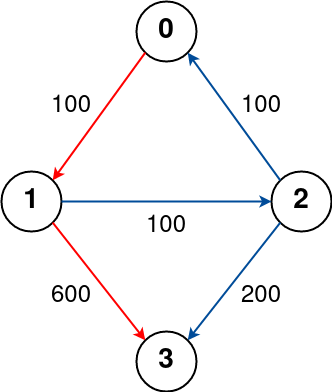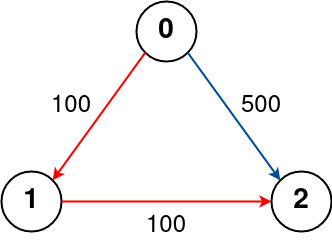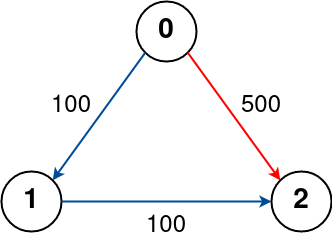LeetCode in Kotlin
787. Cheapest Flights Within K Stops
Medium
There are n cities connected by some number of flights. You are given an array flights where flights[i] = [fromi, toi, pricei] indicates that there is a flight from city fromi to city toi with cost pricei.
You are also given three integers src, dst, and k, return the cheapest price from src to dst with at most k stops. If there is no such route, return -1.
Example 1:

Input: n = 4, flights = [[0,1,100],[1,2,100],[2,0,100],[1,3,600],[2,3,200]], src = 0, dst = 3, k = 1
Output: 700
Explanation:
The graph is shown above.
The optimal path with at most 1 stop from city 0 to 3 is marked in red and has cost 100 + 600 = 700.
Note that the path through cities [0,1,2,3] is cheaper but is invalid because it uses 2 stops.
Example 2:

Input: n = 3, flights = [[0,1,100],[1,2,100],[0,2,500]], src = 0, dst = 2, k = 1
Output: 200
Explanation:
The graph is shown above.
The optimal path with at most 1 stop from city 0 to 2 is marked in red and has cost 100 + 100 = 200.
Example 3:

Input: n = 3, flights = [[0,1,100],[1,2,100],[0,2,500]], src = 0, dst = 2, k = 0
Output: 500
Explanation:
The graph is shown above.
The optimal path with no stops from city 0 to 2 is marked in red and has cost 500.
Constraints:
1 <= n <= 1000 <= flights.length <= (n * (n - 1) / 2)flights[i].length == 30 <= fromi, toi < nfromi != toi1 <= pricei <= 104- There will not be any multiple flights between two cities.
0 <= src, dst, k < nsrc != dst
Solution
class Solution {
fun findCheapestPrice(n: Int, flights: Array<IntArray>, src: Int, dst: Int, k: Int): Int {
// k + 2 becase there are total of k(intermediate stops) + 1(src) + 1(dst)
// dp[i][j] = cost to reach j using atmost i edges from src
val dp = Array(k + 2) { IntArray(n) }
for (row in dp) {
row.fill(Int.MAX_VALUE)
}
// cost to reach src is always 0
for (i in 0..k + 1) {
dp[i][src] = 0
}
// k+1 because k stops + dst
for (i in 1..k + 1) {
for (flight in flights) {
val srcAirport = flight[0]
val destAirport = flight[1]
val cost = flight[2]
// if cost to reach srcAirport in i - 1 steps is already found out then
// the cost to reach destAirport will be min(cost to reach destAirport computed
// already from some other srcAirport OR cost to reach srcAirport in i - 1 steps +
// the cost to reach destAirport from srcAirport)
if (dp[i - 1][srcAirport] != Int.MAX_VALUE) {
dp[i][destAirport] = dp[i][destAirport].coerceAtMost(dp[i - 1][srcAirport] + cost)
}
}
}
// checking for dp[k + 1][dst] because there are 'k + 2' airports in a path and distance
// covered between 'k + 2' airports is 'k + 1'
return if (dp[k + 1][dst] == Int.MAX_VALUE) -1 else dp[k + 1][dst]
}
}

